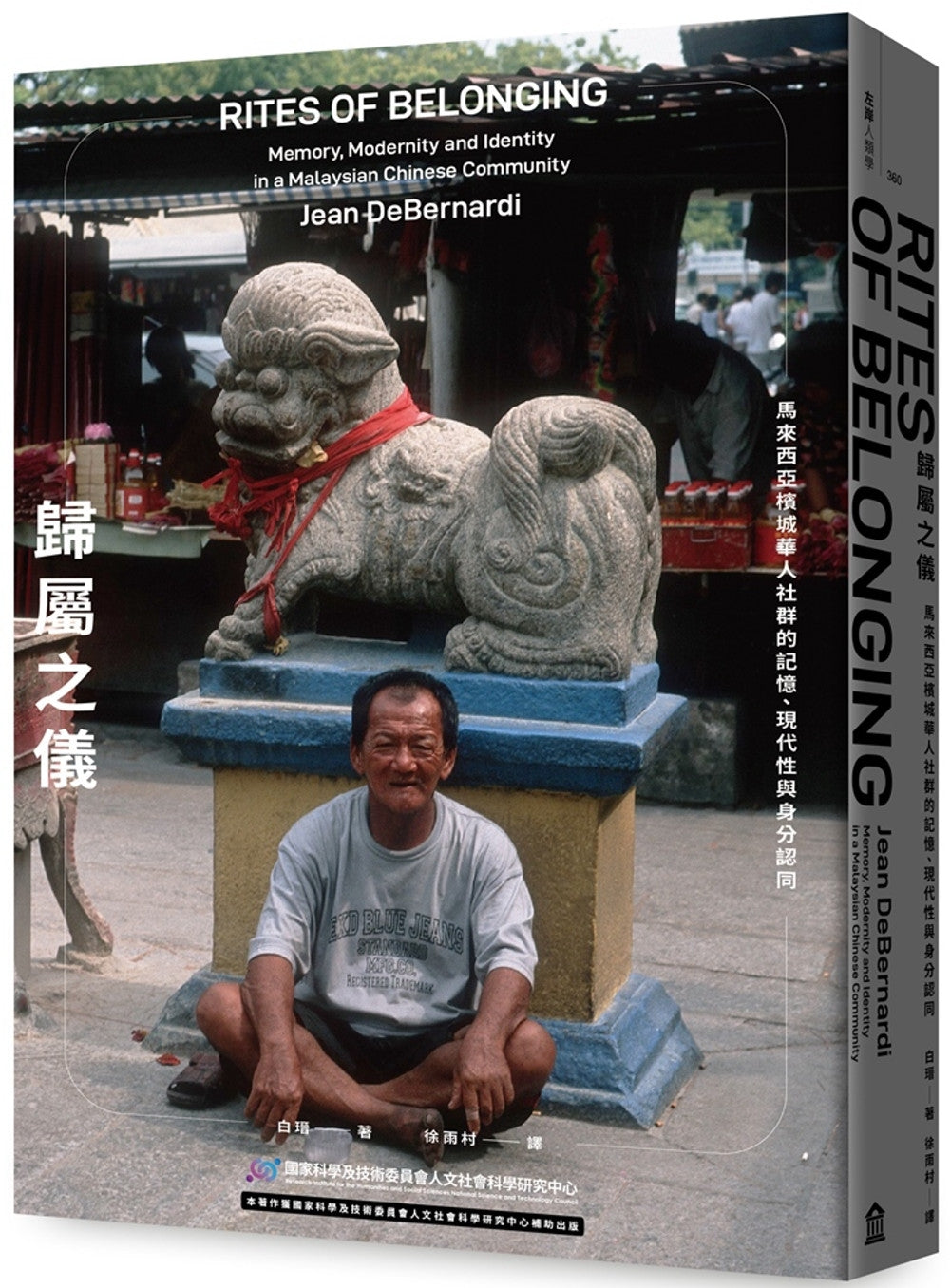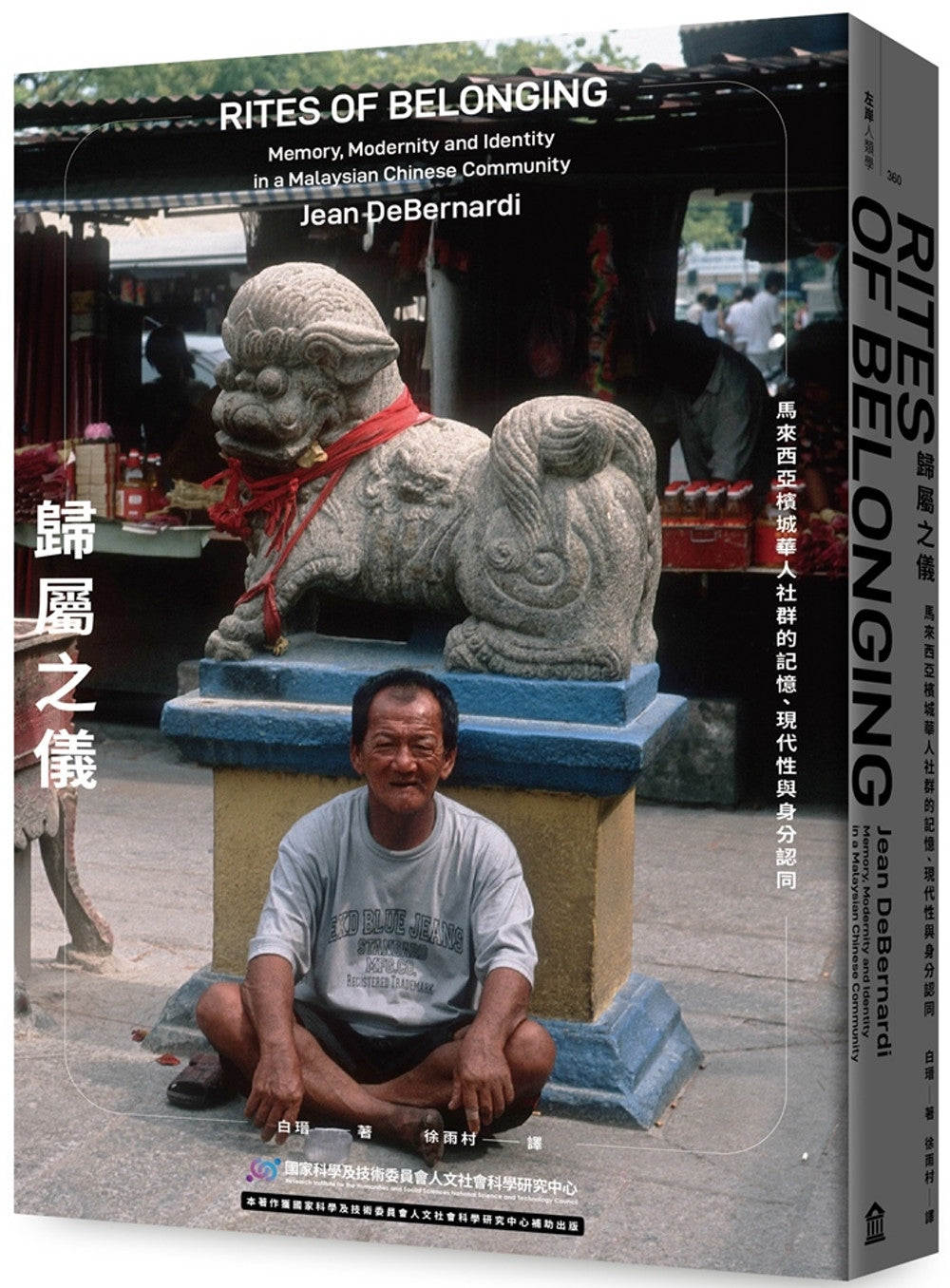Rituals of Belonging: Memory, Modernity, and Identity among the Chinese Community in Penang, Malaysia
Rituals of Belonging: Memory, Modernity, and Identity among the Chinese Community in Penang, Malaysia
1 in stock
Couldn't load pickup availability
出版社: 左岸文化
ISBN/EAN: 9786267209707
出版日期: 2023-12-27
页数: 560页
语言: Traditional Chinese
In 1957, the Federation of Malaya declared independence, transforming the multi-ethnic and pluralistic society previously formed under the British Empire into a modern nation-state. As in many post-colonial states, ethnic identity became a key principle upon which the new nation's political system was constructed. Also like many British colonies, ethnic consciousness in colonial Malaysia was the product of "the encounters and interactions among various groups within it," where "cultural means were employed to deliberately mark differences and inequalities in power, economic status, political ambitions, and historical imaginations."
Chinese temples and festivals are important aspects that cannot be ignored. They are not only a means for Chinese immigrants to establish their social presence, organize social life, and demonstrate their economic strength; Chinese people also convey social memory through cultural practices and create a "memory theater" belonging to their ethnic group.
In 1979, anthropologist Bai Jin traveled to Penang to conduct an ethnographic study of traditional Chinese beliefs. During her fieldwork, she learned Mandarin and Hokkien, a hybrid of Malay and Chinese. She sought to construct narratives of faith and identity from Penang's Chinese community, including mediums, Taoist priests, temple management, and even politicians. However, this fieldwork approach evolved after she arrived in Taiwan in 1987. There, she realized that the political attitudes of the Taiwanese Hokkien people had been shaped by several traumatic events, including the period of Japanese rule, the Kuomintang occupation, and Chiang Kai-shek's loss of mainland China. Penang's more than 150 years of British colonial rule, followed by postcolonial rule under the Malaysian government, also shaped the social memories, rituals, and sociopolitical strategies of the Chinese community. She decided to incorporate historical documents from the British colonial period into her research, attempting to explore the issues of ethnic belonging faced by the Penang Chinese from 1786 to the 1990s from an anthropological perspective.
Bai Jin attempts to rewrite - and reinterpret - the history of the Chinese in Penang using an anthropological perspective and anthropological knowledge.
This book is divided into two parts, following a historical trajectory. The first, "Religion and Society in Colonial Penang," explores the localization of Chinese society in Penang and their responses to British colonial "governance" from a historical anthropological perspective. The second, "Religion and the Politics of Ethnic Revitalization in Contemporary Penang," focuses on another turning point: the 1963 independence of Singapore, North Borneo (Sabah), and Sarawak from British rule, and the formation of Malaysia with the Federation of Malaya. The subsequent events of the May 13 Incident in 1969 and the New Economic Policy in 1970 left the Chinese as second-class citizens, under the Bumiputera/non-Bumiputera divide. Faced with this profound identity crisis, Chinese society responded to political tensions through folk religious celebrations, drawing on traditional culture to foster a sense of shared Chinese identity and attempting to redirect national policy towards territorial nationalism.
Faced with the political domination of the British colonial government and the post-colonial nation-state of Malaysia, the Chinese in Penang attempted to shape social memory through communal rituals, further construct their subjectivity, and reconcile it with the values of modernity, pursuing an independent and contemporary identity.
This is the story of the Chinese in Penang searching for identity; it is also an ethnographic work that uses the Chinese in Penang as an example to further reflect on Chinese diaspora, ethnic belonging, historical memory, modernity and identity.
Jean DeBernardi
A PhD in Anthropology from the University of Chicago, he taught at the Department of Anthropology at the University of Alberta, Canada, retiring in 2021. His research approach is symbolic anthropology, focusing on the folk religion of the Chinese in Penang, the modernization of Taoism in China and Singapore, evangelical Christianity and the Brethren Movement in Singapore, and Chinese tea culture. His fieldwork includes Penang, Singapore, and the Wudang and Wuyi Mountains in China.
Since 1979, Bai Jin has been conducting research on the local Chinese community in Penang, Malaysia, and has established close collaborations with academic institutions there and in Singapore. Rituals of Belonging is the culmination of her years of research and a representative work on Chinese folk religion in Penang. Other publications include The Way that Lives in the Heart: Chinese Popular Religion and Spirit Mediums in Penang, Malaysia (2006) and Christian Circulations: Global Christianity and the Local Church in Penang and Singapore, 1819-2000 (2020).
Xu Yucun
A PhD in Anthropology from the University of Alberta, Canada, he is currently an Assistant Professor in the Department of Cultural Heritage Conservation at National Yunlin University of Science and Technology. His research focuses on cultural anthropology, Southeast Asian Chinese societies, intangible cultural heritage, and Taiwanese folk beliefs. He edited the book "A Comparative Study of Land God Worship: History, Ethnicity, Festivals, and Cultural Heritage" (2018, co-edited with Zhang Wei'an and Luo Lieshi). His research has been published in Taiwan Literature, Thought and Words, Folklore and Opera, Chinese Religious Studies, Asia-Pacific Research Forum, and the Journal of Southeast Asian Studies in Taiwan. His translations include "Ethnic Groups in Southeast Asia Today: Ethnography, Ethnology, and Change in a Complex Region" (2018), "Foreign Families in Formosa: The Story of Heston" (2019), and "The Scenery of Everyday Life in Southeast Asia" (2020).
Recommended: Rituals of Life / Huang Jinshu recommends fieldwork, research, translation, and dialogue with classics / Zhang Wei'an's introduction to Penang Chinese's rituals of belonging: religious performance, social memory, and the spiral of identity / Xu Yucun
Preface to the Chinese Edition (2023)
Table of the romanization of the Fujian dialect for the author's preface
Introduction
Part I: Religion and Society in Colonial Penang <br />Chapter 1: The Localisation of Chinese Society in Colonial PenangChapter 2: “A Very Unreliable and Most Superstitious Group of People”: Trust, Tolerance and Control of the Chinese in the Straits Settlements, 1786–1857Chapter 3: Sense of Belonging and Ethnic Boundaries: European Freemasons and Chinese Oath-BoundariesChapter 4: Rituals of Belonging: Initiation Ceremony of the Chinese Oath-Boundaries
Part II: Religion and the Politics of Ethnic Revitalization in Contemporary Penang <br />Chapter 5: The Right to Belong: Citizenship and Ethnic Nationalism Chapter 6: Time, Space, and Social Memory Chapter 7: The Political Operations of Religious Revitalization Movements: Celebrating the Ghost Festival Chapter 8: Demonstrating Miraculous Powers: The Festival of the Nine Emperor Gods
in conclusion
Appendix: List of Chinese Festivals in Penang, Chinese Proper Noun Comparison Table, Reference Book Notes, Translation Comparison
Share


